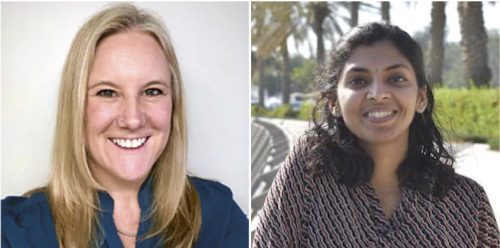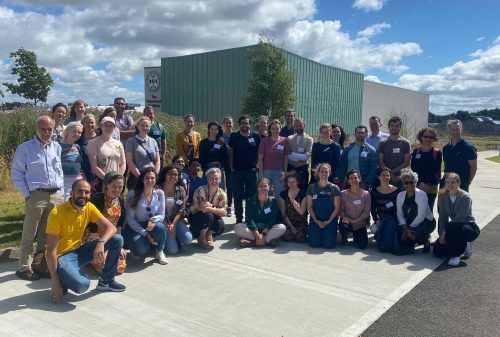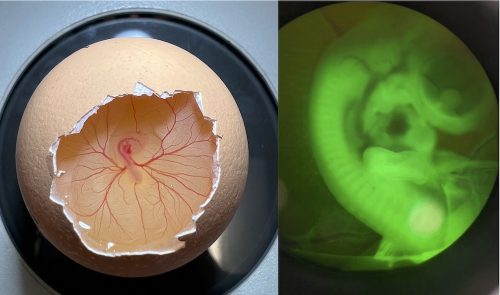Reviews of the Edinburgh Gallus Genomics and Embryonic Development (EGGED) Workshop 2022
Posted by Lindsay Henderson, on 14 September 2022
Mel White, a Principal Investigator and Lakshmi Balasubramaniam, a Postdoctoral Researcher, both attendees of EGGED 2022, provide accounts of their experiences at the workshop in July.

Dr Mel White is a Group Leader and ARC Future Fellow, based at The University of Queensland, Australia.
As a new PI who started my lab in Australia during the COVID-19 pandemic, I was very excited to attend the inaugural EGGED 2022 workshop in Edinburgh, Scotland. Hosted by the Roslin Institute, The Royal (Dick) School of Veterinary Studies & The Roslin Institute’s National Avian Research Facility (NARF). The Edinburgh Gallus Genomics and Embryonic Development Workshop (EGGED) brought together scientists working with or interested in using the chicken embryo as a research model. By combining seminars from invited speakers and practical hands-on demonstrations in the lab, EGGED 2022 showcased the power and versatility of the avian embryo.
The workshop opened with some background about NARF and the exciting transgenic chicken lines already created and in progress. For those new to the avian model, there was an introduction to the chicken embryo and its unique advantages for addressing questions of a spatiotemporal nature by renowned embryologist Claudio Stern. Over four days, further seminars highlighted an impressive range of avian research including teratology (Neil Vargesson), development of the eye (Joe Rainger), limb (Julia Oh) and neural tube (Ashley Libby), neuronal differentiation (Raman Das), determining gene regulatory networks (Ruth Williams, Tatjana Sauka-Spengler), development across scales (Ben Steventon), mechanobiology (Jérôme Gros) and recent advances in our understanding of the chicken genome (Jacqueline Smith, Hervé Acloque). Each day we also spent time in the Vet School teaching lab watching practical demonstrations and practising fundamental techniques such as embryo staging, ex ovo culturing, electroporation, grafting, bead application and organ slice culture. Additionally, there was a full day available to try personalised experiments using our new skills and the NARF transgenic lines.
The generosity of everyone involved in EGGED was truly amazing. As organisers, Megan Davey, Lindsay Henderson and their team worked tirelessly behind the scenes incubating thousands of eggs, setting up equipment and juggling logistics for all manner of experiments. A special mention goes to the indispensable Julia Oh who presented or demonstrated every day, cheerfully sharing her knowledge and answering endless questions. Many of the invited speakers also spent hours sharing their expertise in the labs and discussing science with us long into the evening at the social events afterwards. The attendees ranged from students to PIs, with all levels of avian experience and it was inspiring to see the free exchange of ideas and knowledge as people passed on tips and tricks and shared their specialist skills.
But perhaps even more important than the knowledge we gained were the connections we made. Thanks to the explicit intentions of the organisers, EGGED 2022 was a collaborative workshop where we not only came to learn, but also to join as a community to shape the future of avian research. Over a buffet dinner and drinks, we discussed ideas to enhance access and utility of the model and cooperation and exchange between avian researchers. After a traditional Scottish send-off of boisterous Ceilidh dancing, I returned home to Australia bubbling with ideas and excited to be part of this welcoming research community.

Dr Lakshmi Balasubramaniam, is an EMBO Postdoctoral Fellow in the Xiong Lab, based at The Gurdon Institute, University of Cambridge, UK.
Contrary to the name of this workshop, the aim wasn’t to be egged but explore the different techniques and build networks among those using avian embryo as a model system to study various biological questions ranging from transgenics, developmental biologists to viral production. The EGGED workshop gathered established researchers, early career researchers (postdocs, young PIs), and PhD students from varying stages of their career to discuss and share their knowledge, techniques and tips to get experiments working from the ground up. Expertise of participants varied from newbies (<1 month of experience) to those who have been working with avian embryos for several years. This was definitely a platform to accelerate one’s progress and discuss ideas with a group of likeminded individuals where problems were shared over meals while coming up with solutions during the practical lab sessions.
This 4 day workshop, was packed with networking, lab-based practical work and talks by invited speakers. With a participation of about 40 researchers, the first day started with an introduction to the workshop by organisers Megan Davey and Lindsay Henderson where they introduced the Roslin Institute, the transgenic facility and the home office regulations in place to regulate animal work in the UK. This was followed by a short introduction to the staging of chicken embryos and early development of chicken embryos by Claudio Stern. The afternoon was filled with lab-based practical sessions where we were introduced to various ways of embryo isolation, staging them and identifying the viability of embryos. This was followed by a practical session led by Neil Vargesson where he gave us an introduction to the use of beads to coat proteins/drugs in localized regions followed by free form lab work.
The second day started off with a talk by Mike McGrew who introduced his latest technique accelerating transgenic development by growing PGC’s in-vitro. Following this we had an overview of various early career researchers demonstrating the use of transgenics in different contexts ranging from eye development, limb regeneration and neural tube development. We then nosedived into a practical session led by Megan Davey and Julia Oh who demonstrated tissue grafting to trace tissue integration using transgenic embryos. While many of us failed to have embryos that survived overnight, a handful of embryos survived overnight culture demonstrating the power of this technique. Following this we had a session led by Raman Das who showed us explant cultures enabling us to live image inaccessible regions of the embryo at high resolution. The last session of the day had Ruth Williams demonstrating in-ovo and ex-ovo electroporation as a tool to genetically engineer chicken embryos. Many of us had the opportunity to test out both of these setups and get tips from Ruth on how they could be adapted for use in our labs.

The third day started off with a talk by Ben Steventon where he introduced the role of the node, which was followed by a free form lab session where we were left to play with the techniques we learnt. In parallel we were shown how to make tools, ex-ovo imaging of chicken embryos in a cup and tips on gene editing, CRISPR construct design, and PGC injections. This was followed by a session on clearing techniques and an introduction to Zeiss lightsheet. The day ended with talks by Jacqueline Smith who discussed the role of using avian embryos to study viral host interaction while Hervé Acloque introduced us to his initiatives to annotate avian genes, the FAANG initiative, Galdbase (genomics and sequencing data of avian embryos) and the VizFaDa (tool to visualize sequencing datasets). While the day of practical work and talks ended there, scientific discussions continued over at the “Brainstorming Buffet” where participants continued to discuss publishing, funding, ethics, science communication and a myriad of new ideas in small groups that swapped around the room.
The last day of the workshop started off with online talks by Tatjana Sauka-Spengler who discussed their work on generating single cell atlas during neurulation, and transcriptional activity during neurulation and neural tube closure. This was followed by Jérôme Gros who shared their latest work showing gastrulation to be mediated by signalling molecules like GDF1 with feedback from mechanics. He also described their efforts to develop various transgenic quail lines that are available for the wider community. Before continuing our last day of practical sessions, we were introduced to HCR as an alternative to RNA hybridization. We were walked through the different steps during HCR, with tips and how one goes about ordering and designing HCR probes. We were generously gifted with starter kits by Molecular Instruments kind sponsors of this workshop. The workshop ended on a high note with dinner that had us put on our dancing shoes to dance to Ceilidh followed by goodbyes at the end of this 4 day workshop, which was packed with information, tips and networking. To me, this was an opportunity to learn the different techniques used to study avian embryogenesis while building a network of researchers working on similar questions.


 (No Ratings Yet)
(No Ratings Yet)